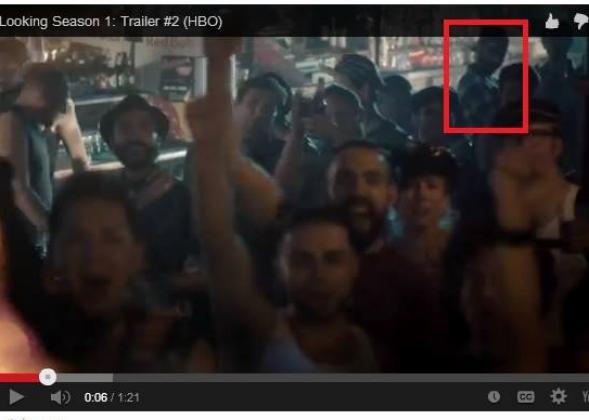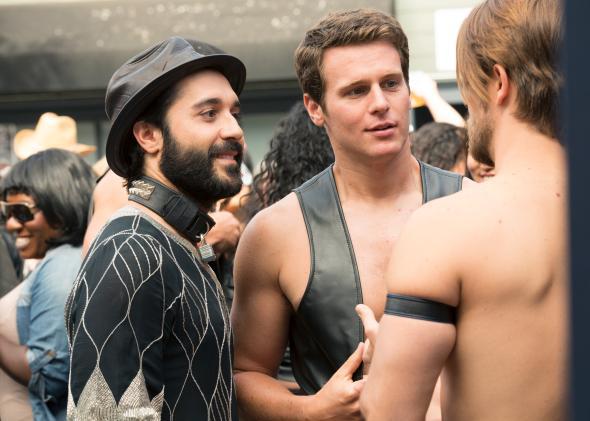At the beginning of the day we are instructed that our chief job is to be quiet. We’re “background,” and the mics pick up everything. “Don’t talk to the actors, don’t talk to the crew, don’t talk to each other, just don’t talk,” we’re told by a team of production assistants. Our job as extras is to just fill up space, be seen but not noticed, to look like we’re having fun but not actually have too much fun.
Yet after several hours of dancing to the same 10 seconds of a slow, sexy house track in this fake party in a windowless gay bar filled with real San Francisco leather daddies and drag queens made to look like an actual party in a real gay bar with more or less the same clientele, things have gotten a little looser. The fake is getting real.
It’s an easy slip to make. The scene, for the first season of HBO’s new show Looking, which premieres on Sunday, takes place in a divey gay bar as it’s throwing an after-party for San Francisco’s notorious Folsom Street Fair. We’re in the Stud, an actual divey gay bar, only a few days after San Francisco’s actual Folsom Street Fair.
I’ve been here before. About a week ago, I came to this same bar and stood here holding a beer in the exact place I’ve now been instructed by a film crew to stand for hours holding a fake beer. And rather than fake cruising for good-looking young men for the cameras, I was actually cruising for good-looking young men for myself. A few days later, I came across the casting call for people who could play “Mission hipster types comfortable in gay bars.” More than one friend emailed me the posting saying more or less: “This is your life.”
I sent in a headshot of myself wearing my most comically obvious queer-hipster look (flannel shirt, cutoffs, and big-framed reading glasses). A few days later, I got a call from the casting agency: “We love your look, you’re perfect.” If this was indeed my life, I certainly had to see it for myself.
* * *
I’ve been holding my prop beer all morning, a Budweiser bottle filled with some off-smelling carbonated liquid, but in this dark space of growing body heat, I feel lightheaded, technically sober but kind of drunk. I feel looser, too. Standing next to a new set friend, things have gotten a little flirty. We don’t really care if the PAs get mad at us for shifting out of our assigned spot and closer to the dance floor. I make fun of him and tell him he’s a bad fake dancer, touching his chest as I do so.
And then, I immediately snap into focus. An assistant director instructs the not-super-famous but still-pretty-famous star of the show to stand next to “the guy in the red hat.” I am the guy in the red hat. Suddenly, I am standing next to the star. He’s shirtless under a black leather vest. If I look down and to the right, I can see his nipples. A famous person’s nipples are close enough to touch.
He’s an actor I didn’t think much about prior to this exact moment. But now he’s standing right next to me. TV stars always seem to be shorter in real life, and he is, but his body is also perfect; sculpted biceps, a flat stomach, and a sturdy set of pecs ripple under that vest. I’ve heard rumors that Looking, in true premium cable fashion, has lots of steamy sex scenes.
I wonder what the right protocol is. In some ways, he and I are co-workers, and it feels awkward not to say anything as we share this space together—just a friendly “Hello” or, “I think you’re doing a great job.” In other ways, though, we’re not co-workers at all, and the warning not to talk to the actors echoes through my head.
I also think—or imagine—that something could happen between me and this pretty famous person. Earlier in the day when he had to cross in front of me a dozen times, I swear he gave me a little smile. Maybe this actor, this Hollywood star (whom a quick on-set Googling confirmed is, indeed, gay) saw something attractive in me. He has nice big blue eyes.
I know it’s an absurd fantasy, but given where we’re standing, given that I’ve made all sorts of eyes at all sorts of men in this very spot, it’s an easy fantasy to fall into. In gay bars, an exchange of looks can tell you everything you need to know about another person’s desires. But sometimes, a look is just a look—especially when that gay bar is also a film set.

Annotation by Jonathan Cuevas
But when a chorus of crew members calls “rolling, background, action,” and he walks away, the fantasy fades. Of course, he wouldn’t be looking at me. This is what it is to be an extra, or “background artist.” It’s a paradox, a push and pull of expectations. At one moment, you feel thrillingly close to the Hollywood action and its appealing players, and the next like a total outsider. Sure, you get invited to the party, but you’re just there as human fill.
Even the most blasé extras among us, the ones who are just doing this for the story to tell co-workers, to kill time, or for a day’s minimum-wage pay, are concerned about the same thing. Between takes, you hear lots of whispering and speculating about who was in the shot. There’s a real sense of disappointment emanating from the extra in the back who’s never instructed to make a move closer to the camera before they call, “Cut.” All of us want to be on camera. We want to do more than look; we want to be seen.
As an extra, you are poised perilously close to the Hollywood dream machine. Somewhere in my brain, Singin’ in the Rain is playing. Despite my better judgment, I’ve cast myself as Debbie Reynolds and the Star With Nice Nipples as Gene Kelly, ready to discover me in the crowded chorus.
When film cameras are rolling, you find yourself thinking in these Hollywood tropes. Not only am I the chorus girl poised for my big break, but I’ve also cast myself as the frumpy nerd in glasses who the handsome leading man eventually realizes is secretly hot. What if Star With Nice Nipples and I got a drink after the day’s shoot? When he comes to reset himself next to me after the first take, it’s an idea that strangely doesn’t feel too far-fetched. When he’s close enough to touch, I both want him and want to be him, and either seems possible. But when he walks away into the crowd of bodies and the spotlight, reality sets in. I’m not the object of desire for anyone with those movie-star good looks. I could never pull off that vest.
After filming for nearly 10 hours, the crew sets up the final shot of the day. The Star With Nice Nipples and his TV love interest are dancing, and then they’re making out. The extras are instructed to pack close into the dance floor so that when the camera moves through the room, it can navigate a sea of bodies to discover two beautiful men in a full embrace.
I’m instructed to stand back as the camera pushes through the crowd, and, for the first time all day, I see what the camera is capturing. On a monitor rigged to its side, I watch how the camera shifts in and out of focus on the two actors’ hands grabbing each other’s asses, their tongues touching, their lips locked. They look incredible.
I am completely rapt, forgetting I’m supposed to keep dancing as if I don’t even notice they’re there, as if there isn’t a giant camera filming two amazing-looking men sharing a transcendent moment of passion. I’m destroying the reality of the scene. But the real-life reality of my scene is this: I’ve spent many nights at bars just like this watching other better-looking boys find each other and connect. I’ve been at the fringes of many dance floors filled with a longing to be in the center, longing to do more than just look. I’ve clutched a beer just like this prop beer, and wished it were some stranger’s body.
Across the crowded room, I see another extra doing the same thing I’m doing, his eyes fixed on the actors. He looks up and sees me too. We’re no longer looking at Looking, but at each other. In that momentary exchange of glances, new realities suddenly seem possible.
Disclosure: Slate deputy editor Julia Turner’s husband works on the show.
